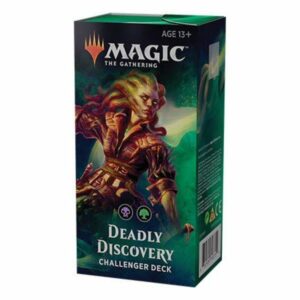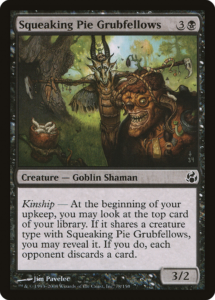There’s a couple of great lines in John Gardener’s novel The Sunlight Dialogues which I’ve been thinking about all year.
“There are no grown-ups. There are only children and dead people.”
Of course, the idea here is that we’re all (and always) children and that we’re all pretending to be adults. I’m down with this and find it absolutely true. So when I read criticism or self-critique from Magic: The Gathering players that what we enjoy is “just a children’s card game,” I think “Yup. Sure is.” But also I think, “Um, all games are children’s games?”
As I reflect on 2022, especially with respect to Magic, I have to confront the fact that I started playing at 40 years old. If I started chess or tennis at 40, no one would blink. But Magic: The Gathering?
Feels a bit like a delayed reunion, though. I was a pre-teen when the Alpha set came out. I remember seeing guys in the local comic shop turning cards sideways. That seemed so foreign to me. Maybe it would’ve been an enticement for me to jump in, but no one took me aside to learn. None of my friends ever got into it, let alone were aware of it. Years passed (lots of years), and I never paid any mind to Magic. Then, this past year, coming out of the worst of COVID, my interest in writing and reading dried up completely. This was due to burnout, personal tragedy, and professional let downs. Let me tell you something, reader. All I am is reading and writing. I teach college writing and writing fiction. My pastime is books. So I had nothing. I was nothing. For months, I drifted.
Over the summer, Magic slid over my mental radar. I’d been playing a lot more games with my kids: card games, board games, outside ball games. I’d run a few homebrew D&D sessions for my oldest child. He’d been watching YouTube videos of gameplay for Sonic the Hedgehog and Minecraft. His continued enthusiasm sparked in me a desire to be a part of a shared, intense activity. I decided to finally learn how to play Magic. I discovered the Prof’s Tolarian Community College channel and proceeded to educate myself. Then I tried to play Arena, only to find it’s not my cup of tea.
Despite these early bumps, I was reluctant to enter an LGS. Why? Because I was succumbing to the fear of the accusation above. You’re a middle-aged guy–why are you suddenly playing this children’s game? I thought the environment in a game store would be so exclusive that my naïve gleam would blind everyone. But I also hesitated because I didn’t want to foul up and look foolish. Yet, my son’s infectious enthusiasm prodded me to meet strangers and gather.
Part of Magic’s allure was the element of creativity that runs parallel to my writing career. I’d found a substitute. I’d found another source of interest to sustain me. The unique arrangement of aesthetic pieces. The expression of individuality through the card’s operations and vibe. It’s a different creativity, sure, but a similar one all the same. A friend once described Magic as “engine building,” and I can see that. Piloting a deck might not have that feeling of construction, but you still have to learn the ins and outs. And let’s admit it: deck brewing is a form of procedural alchemy. Then there was the learning and absorbing a whole new body of knowledge. All the rules. All those cards. The culture. The lingo. It was (no joke) thrilling. As a teacher who’s been working in academic realms for years, I think the leap into game mechanics and the fabric of Magic was a life preserver thrown at a drowning man. There was art, there was text, there was the need for imagination. It revived my enthusiasm for imagination and play.
Let me reiterate that last part: I needed to be reminded of play. I wanted to stress my mettle.
Well, my first actual, in-person game was during a Modern night at my LGS. I’d found a 2019 Deadly Discovery Challenger Deck in a different store for a decent amount of money. I bought it and sided in a few upgrades. I added some Thrashing Brontodons and a Carnage Tyrant. I leaned into the Golgari thing and tossed in Grim Flayers and Scavenging Oozes. My first match up was against a Living End deck. I got hosed. When those creatures returned from the graveyard and smacked me, I was confused but impressed. My deck had no chance of winning anything. But I loved playing it. I wanted to see what it could do against the meta. My next two matches included a Valakut deck and Azorius Control deck.

And that is the ultimate form of play: the notion of keeping the game going, no matter what the ultimate binary outcome is. I mean–people are going to want to win and hate to lose. No doubt, it feels great when you win one. But just the process of playing the game seemed to be enough for me.
Eventually, I found this site and read Travis Norman’s “Letting Go of the Past to Move into the Future.” While the article’s tone is lovingly sombre and reflective–there was no denying the love of the game and the camaraderie described hadn’t changed Travis in some fundamental way. I wanted that! (Do read the piece, please. It’s a touching encomium to Magic as a social lodestone.)
But all of this should not surprise us. According to cultural historian Johan Huizinga, in his classic study of play in human life, Homo Ludens, he writes: “Social life is endued with supra-biological forms, in the shape of play, which enhance its value. It is through this playing that society expresses its interpretation of life and the world. By this we do not mean that play turns into culture, rather that in its earliest phases culture has the play-character, that is proceeds in the shape and mood of play. In the twin union of play and culture, play is primary.”
Play is primary. Play binds. It bonds. It broaches. Let me lay out a few of the surprising moments from my first months as a Magic player that are evidence of this mood of play.
- I knew I wanted to play some kind of mono black deck. As such, it would need 4 Fatal Pushes. When I dropped off my list at the LGS, the employee said that they were out of them. Bummed, of course, but not defeated. From behind me, I heard, “Um, excuse me. You’re looking for a Fatal Push?” Another store patron nervously extended a card out to me. I asked how much he wanted for it. He shook his head. “Take it. It’s yours. You need it.” I know these are just pieces of cardboard. But some of them aren’t cheap. And this guy knew me from nothing. For some reason, this moved me. It revealed to me a sense of community. His generosity, though, did display to me a recurring theme I was to encounter again and again in the closing months of 2022.
- I started playing commander on Saturdays with a group of folks I met at a local board game parlor. I had mentioned that I needed an Urborg, Tomb of Yawgmoth for my 8-Rack deck. A week later, one of the guys, Doug, walked in and handed me a card. The Urborg. Again, shocked, I asked what he would like in return. He waved me off. Nothing. “I’ll let you know when I need something,” he said. But I knew he’d never ask.
- And then there’s the endless help–truly honest and productive help–with one’s deck tech. Analyzing card interactions, critique of methods and strategy. Everybody wants everyone else to get better.

These fellows look like they’re having a lovely time, no?
I have made friends and tightened the weave of my social life in the past few months. This, in a time when we all recognize how hungry the human mind can be for face-to-face and meaningful interactions. And, perhaps, when we get down to it, there really only is play. When we forget that, and abandon our need for play–when we ignore it, deny it, betray it, even–we miss the most elemental nature of humanity: that without play, we’re cut off from one another. And if what I’ve observed in the past few months holds true, then there’s nothing more fulfilling than playing around with your friends–no matter what age you are. We’re all children and we’re not dead yet. So let’s keep the game going.
Kyle Winkler (he/him) is a teacher and fiction writer. While he was pre-teen when Magic: The Gathering was released, he didn’t start playing until recently. He’s the author of the cosmic horror novella (The Nothing That Is), a collection of short stories (OH PAIN), and a novel (Boris Says the Words). He’s trying to make Obzedat, Ghost Council work as the commander for his most recent deck.

